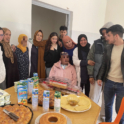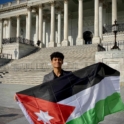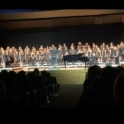Maryame has taken the lessons learned from her exchange year to make a difference in her community.
STORIES
Ramadan in Palestine!

As the holy month of Ramadan begins for Muslims around the world, many YES alumni are sharing special cultural traditions with their friends and families at home. And they want to share with you as well!
In the West Bank and Gaza, Palestinian Ramadan traditions are quite similar to one another and also distinct from other communities in the region.
Several alumni in Gaza came together to explain:
“The holy month of Ramadan is a chance for all Muslims around the world to celebrate equality and tolerance. A typical Gaza Ramadan starts out with Suhoor when the Mosaharati walks around the streets banging on his drums singing loudly and urging people to wake up before the sun comes out. The Suhoor meal usually consists of bread, hard-boiled eggs, cheese, beans, and a cup of tea.
During the day, Gazans spend their time preparing food, reading the holy Quran, praying and watching Ramadan-special soap operas and comedy shows. When the sun sets and its Iftar time, which means the breaking of the fast, families all come together around one big table to enjoy Ramadan’s special menu. People usually break their fast by eating dates, then drinking water and eating the usually “Lisan Alasfour” soup (it literally means Sparrow’s Tongue).

Ramadan also has its specialties when it comes to desserts. Qatayef is a popular favorite only available during the holy month. Qatayef is a pancake like sweet dumpling that is stuffed with either cheese, cream, nuts, or Nutella.
Ramadan is a special month in Gaza where people stick together and embark on community service and charity campaigns in order to help the needy and homeless. Usually by the end of the holy month, people take out a portion of money called, Zakat al-Fitr, which is paid directly to a needy family.”
In the West Bank, the YES alumni describe something similar:
"To celebrate this holy month, we decorate our houses, streets, and windows with beautiful lights in the shape of crescents and stars. We start our day very early to have the “Suhoor” meal - the meal eaten before alfajir prayer – which comes before dawn. Some youth from the area volunteer to wake people from their sleep every day during Ramadan for “Suhoor”. They do this by wandering the streets and banging on drums and singing a special song reminding people that it is time to wake up and have “Suhoor”.
When the sun begins to set, we start preparing the Iftar table in order to break our fast. Usually families, friends, and neighbors eat this meal together. It includes dates, fresh juice, soup, and delicious Palestinian food like “Maqloubeh”, “Mansaf”, and stuffed grape leaves. Once the Maghreb Adhan (evening call for prayer) is called out by mosques, announcing that the sun has set, people say their prayers, eat, and enjoy the special traditional Ramadan desert “Katayef”. The best part of the evening is when the members of the family gather to enjoy each other’s company and appreciate the importance of strong family ties.

Ramadan is also a time for increasing good deeds and charity. Mosques and community centers offer Iftar meals for the poor. People start to give “Zakat” (money, food, clothes, etc. given to the poor people). Many people spend Ramadan focusing strengthening their family ties, doing good deeds and strengthening their connection to God."
We hope you are also celebrating this month with your loved ones, with your own cultural traditions!





